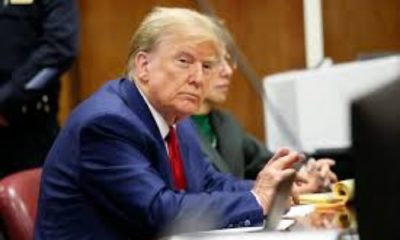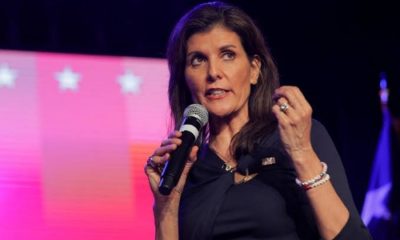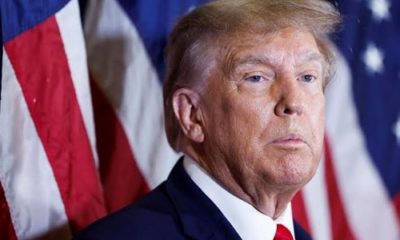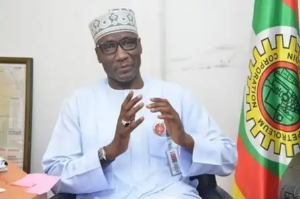Breaking News
How Donald Trump Was Indicted By A Grand Jury

Former President of the United States of America and a leading candidate in the Republican Presidential Primaries race, Donald Trump, on Thursday, has been indicted by a Manhattan Grand Jury.
According to New York Times, for nearly five years, confidential records have identified a continuing grand jury inquiry in Manhattan as “Investigation Into the Business and Affairs of John Doe.”
But soon, that secret matter will get a more recognizable name: “The People of the State of New York against Donald J. Trump.”
The seeds of Donald J. Trump’s indictment by the Manhattan district attorney’s office were planted 17 years ago, at a celebrity golf tournament in Nevada, where he met Stormy Daniels in July 2006.
At the time, Mr. Trump was the 60-year-old star of “The Apprentice,” a reality show in which contestants competed in a test of their business acumen. She was a 27-year-old pornographic film star and director.
It may take several days for Mr. Trump to appear at the courthouse. Now that the grand jury has voted to indict him — meaning to charge him with felony crimes — the indictment will remain sealed until his expected arraignment on Tuesday, when the charges will be formally revealed.
After the indictment, prosecutors contacted Mr. Trump’s defense lawyers and negotiated the terms of his surrender, a common practice in white-collar investigations.
Lawyers for Mr. Trump, who is running for president a third time, said late Thursday that he will surrender and he is expected to be arraigned on Tuesday.
After he is arraigned, he is almost certain to be released on his own recognizance, because the indictment will likely contain only nonviolent felony charges; under New York law, prosecutors cannot request that a defendant be held on bail in such cases.
In the unlikely event that the former president refuses to surrender, Gov. Ron DeSantis of Florida has already said that his state “will not assist in an extradition request,” should one come from New York authorities. Still, if the New York prosecutors were to actually seek Mr. Trump’s extradition, and Mr. DeSantis attempted to protect his Republican rival, he could possibly face legal action himself.
Here are the key events that led to the indictment.
The investigation by the Manhattan district attorney’s office into Donald J. Trump’s hush-money payments to a pornographic film star, which led to the indictment of the former president, has spanned nearly five years.
On the 21st of August, 2018, Mr. Cohen, previously a personal lawyer and fixer for Mr. Trump, pleaded guilty to federal crimes and told a court that Mr. Trump had directed him to arrange hush-money payments to two women. The payments were made during the 2016 campaign to keep the women from speaking publicly about affairs they said they had conducted with Mr. Trump.
Soon after Mr. Cohen’s admission, the Manhattan district attorney’s office opened an investigation to examine if the payments broke New York State laws. The office soon paused the inquiry at the request of federal prosecutors, who were still looking into the same conduct.
In August 2019, The district attorney’s office subpoenas the Trump Organization.
After federal prosecutors said that they had “effectively concluded” their investigation, Cyrus R. Vance Jr., the Manhattan district attorney at the time, revived his own inquiry. Late in the month, prosecutors in his office issued a subpoena to the Trump Organization and another subpoena to Mr. Trump’s accounting firm, demanding eight years of Mr. Trump’s personal and corporate tax returns.
On the 19th of September, 2019, Mr. Trump’s lawyers sue to protect his tax returns.
The lawsuit, filed in U.S. District Court in Manhattan, argued that a sitting president cannot be criminally investigated. It led to a lengthy delay.
On the 9th of July, 2020, Mr. Vance wins his first key victory at the U.S. Supreme Court.
After appellate judges ruled against Mr. Trump, the lawsuit found its way to the Supreme Court, where the justices ruled that the presidency did not shield Mr. Trump from criminal inquiries and that he had no absolute right to block the release of his tax returns.
The ruling left Mr. Trump with the opportunity to raise different objections to Mr. Vance’s subpoena.
In the Autumn of 2020, Prosecutors interviewed employees of the main bank and insurance company that serve Mr. Trump and issued several new subpoenas.
The district attorney’s office also signaled in another court filing that it had grounds to investigate the president for tax fraud.
On the 22nd of February, 2021, the Supreme Court denies Mr. Trump’s final bid to block the release of his returns. The brief unsigned order was a decisive defeat for Mr. Trump and a turning point in Mr. Vance’s investigation.
Just hours later, eight years of financial records were handed over to Mr. Vance’s office.
In the spring, Mr. Vance’s prosecutors set their sights on Allen H. Weisselberg, the Trump Organization’s long-serving chief financial officer, whom they hoped to pressure into cooperating with their investigation.
The prosecutors were particularly interested in whether the Trump Organization handed out valuable benefits to Mr. Weisselberg as a form of untaxed compensation.
on the 1st of July 2021, the Trump Organization was charged with running a 15-year tax scheme.
When Mr. Weisselberg refused to testify against his boss, prosecutors announced charges against him and Mr. Trump’s company, saying that the company helped its executives evade taxes by compensating them with benefits such as free cars and apartments that were hidden from the authorities.
On the 1st of January 2022, a new Manhattan district attorney takes office. Mr. Vance left office, and his successor, Alvin L. Bragg, took over the case. Both are Democrats.
Mr. Bragg, a former federal prosecutor, retained two of the investigation’s leaders, Mark F. Pomerantz, an experienced former federal prosecutor and white-collar defense lawyer, and Carey Dunne, Mr. Vance’s general counsel.
On the 23rd of February, 2022, two prosecutors resign, leaving the investigation’s future in doubt.
After Mr. Bragg expressed reservations about the case, Mr. Pomerantz and Mr. Dunne suspended the presentation of evidence about Mr. Trump to a grand jury. A month later, they resigned, prompting a public uproar over Mr. Bragg’s decision not to proceed with an indictment.
In his resignation letter, which was later obtained by The New York Times, Mr. Pomerantz said that Mr. Trump had been guilty of numerous felonies.
On the 18th of August 2022, Allen Weisselberg pleads guilty and agrees to testify against the Trump Organization.
Though the chief financial officer declined to turn on Mr. Trump himself, he agreed to testify at the October trial against the company that he had served for nearly half a century.
In late summer of 2022, the prosecutors turn back to hush money.
After several months, Mr. Bragg’s prosecutors returned to the long-running investigation’s original focus: a hush-money payment to Stormy Daniels, a pornographic film actress who said she had a sexual relationship with Mr. Trump.
On the 24th day of December 2022, the Trump Organization is convicted, securing a significant victory for the district attorney.
Mr. Bragg’s prosecutors won a conviction of Mr. Trump’s family business, convincing a jury that the company was guilty of tax fraud and other crimes.
In January 2023, the district attorney impanels a new grand jury. The grand jury met throughout the next three months and heard testimony about the hush-money payment from at least nine witnesses.
Midwinter 2023, Prosecutors signal that an indictment is likely, offering Mr. Trump a chance to testify before the grand jury.
Such offers almost always indicate an indictment is close; it would be unusual to notify a potential defendant without ultimately seeking charges against him.
On the 18th of March 2023, Mr. Trump predicts his arrest and calls for protests.
Without any direct knowledge, the former president posted on his Truth Social account that he would be arrested three days later and sought to rally supporters to his side. His prediction was soon walked back, and he was not arrested at that time.
On the 30th of March 2023, Mr. Trump is indicted by a grand jury.
The charges, which are still unknown, will be the first against any president, current or former.
Breaking News
NNPC JV Unveils New Crude Oil Grade ‘Nembe’, Commences Exports With 1,900 Barrels

Precious ADELOLA
The NNPC/Aiteo Joint venture has announced the introduction of Nembe Crude Oil Grade, a new crude oil grade into the international crude oil market.
The announcement of the Nembe Crude Oil Blend, produced by Aiteo, the Operator of the NNPC/Aiteo Oil Mining Lease (OML) 29 Joint Venture (JV), was made at the ongoing Argus European Crude Conference in London, on Tuesday.
OML 29, an asset located onshore Nigeria, is operated by Aiteo Eastern Exploration & Production Ltd, Africa’s leading indigenous hydrocarbon producer, following a historic acquisition from Shell in 2014.
The Nembe Crude was previously blended with the popular Bonny Light grade and exported via the Bonny Oil & Gas Terminal.
The unique selling point of the Nembe Crude Oil grade with an API gravity was highlighted by both the Aiteo E & P and NNPC Limited Leadership at the Argus Conference in London.
The Nembe Crude Oil grade also has a low sulphur content and low carbon footprint due to flare gas elimination, fitting perfectly into the required spec of major buyers in Europe.
Two cargoes of 950,000 barrels each of the Nembe Crude Oil grade have since been exported to France and the Netherlands. With its attractive Assay of API 29 and low sulphur content, the Nembe Crude Oil grade commands a premium to the global Brent benchmark.
With the NNPC-Aiteo OML 29 JV back on-stream, Nigeria now boasts of an additional crude oil export of 2 Cargoes at 950,000 barrels each per month and 1.2 Bcf of export gas monthly.
This remarkable achievement signals the commencement of activities at Nigeria’s newest crude oil terminal, the Nembe Crude Oil Export Terminal (NCOET), which was licensed in line with the extant laws and Crude Oil Terminal establishment regulations.
The terminal was conceived as a Floating Storage and Offloading Vessel (FSO) with a storage capacity of two (2) Million Barrels and the ability to offload crude oil to any export tanker from AFRAMAX to Very Large Crude Carriers (VLCC).
It has a loading capacity of 25,000 barrels per hour and will be exporting over 3.6 million barrels of Crude oil monthly at full scale of operation.
Currently, hydrocarbon production from OML 29, which was hitherto constrained due to evacuation challenges owing to the security issues around the Nembe Creek Trunk Line (NCTL) corridor, has now been resolved through a collaborative and creative approach that led to the innovation of the Alternative Crude Oil Evacuation Solution.
The Argus European Crude Conference 2023 in London is a gathering of energy majors, refiners, NOCs, traders, financial institutions, and other representatives from across the global oil markets. The event also provides a critical opportunity for business leaders to connect, discuss, share and learn from one another.
Breaking News
Nigeria Owes NNPCL US$3.1bn, As Subsidy Hits US$921.5m Monthly

Breaking News
JUST IN: Tribunal Sacks Gov Uba Sani, Declares Election Invalid
Governor Uba Sani of the All Progressives Congress (APC) was removed from office on Thursday by the governorship Election Petition Tribunal sitting in Kaduna State.
The panel ruled that the state’s 2023 governorship election was invalid.
According to information gathered by Biztellers, the judges avoided the actual auditorium and instead communicated the decision via zoom.
It commanded the holding of new elections in seven wards across four local government units in the State.
Isa Ashiru, a candidate for the Peoples Democratic Party, and the PDP filed the petition.




















